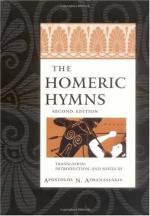So spake he and took her hand; while laughter-loving Aphrodite turned, and crept with fair downcast eyes towards the bed. It was strewn for the Prince, as was of wont, with soft garments: and above it lay skins of bears and deep-voiced lions that he had slain in the lofty hills. When then they twain had gone up into the well-wrought bed, first Anchises took from her body her shining jewels, brooches, and twisted armlets, earrings and chains: and he loosed her girdle, and unclad her of her glistering raiment, that he laid on a silver-studded chair. Then through the Gods’ will and design, by the immortal Goddess lay the mortal man, not wotting what he did.
Now in the hour when herdsmen drive back the kine and sturdy sheep to the steading from the flowery pastures, even then the Goddess poured sweet sleep into Anchises, and clad herself in her goodly raiment. Now when she was wholly clad, the lady Goddess, her head touched the beam of the lofty roof: and from her cheeks shone forth immortal beauty,—even the beauty of fair-garlanded Cytherea. Then she aroused him from sleep, and spake, and said:
“Rise, son of Dardanus, why now slumberest thou so deeply? Consider, am I even in aspect such as I was when first thine eyes beheld me?”
So spake she, and straightway he started up out of slumber and was adread, and turned his eyes away when he beheld the neck and the fair eyes of Aphrodite. His goodly face he veiled again in a cloak, and imploring her, he spake winged words:
“Even so soon as mine eyes first beheld thee, Goddess, I knew thee for divine: but not sooth didst thou speak to me. But by Zeus of the AEgis I implore thee, suffer me not to live a strengthless shadow among men, but pity me: for no man lives in strength that has couched with immortal Goddesses.”
Then answered him Aphrodite, daughter of Zeus:
“Anchises, most renowned of mortal men, take courage, nor fear overmuch. For no fear is there that thou shalt suffer scathe from me, nor from others of the blessed Gods, for dear to the Gods art thou. And to thee shall a dear son be born, and bear sway among the Trojans, and children’s children shall arise after him continually. Lo, AENEAS shall his name be called, since dread sorrow held me when I came into the bed of a mortal man. And of all mortal men these who spring from thy race are always nearest to the immortal Gods in beauty and stature; witness how wise-counselling Zeus carried away golden-haired Ganymedes, for his beauty’s sake, that he might abide with the Immortals and be the cup-bearer of the Gods in the house of Zeus, a marvellous thing to behold, a mortal honoured among all the Immortals, as he draws the red nectar from the golden mixing-bowl. But grief incurable possessed the heart of Tros, nor knew he whither the wild wind had blown his dear son away, therefore day by day he lamented him continually till Zeus took pity upon him, and gave him as a ransom of his son high-stepping horses that bear the immortal Gods. These he gave him for a gift, and the Guide, the Slayer of Argus, told all these things by the command of Zeus, even how Ganymedes should be for ever exempt from old age and death, even as are the Gods. Now when his father heard this message of Zeus he rejoiced in his heart and lamented no longer, but was gladly charioted by the wind-fleet horses.




